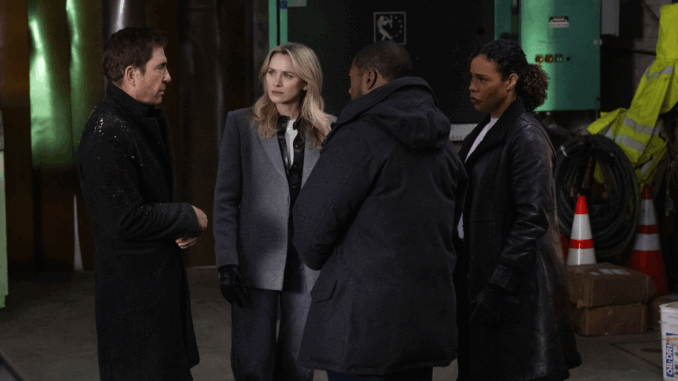
On the surface, they were the picture of marital bliss. Neighbors admired them, friends envied them, and even strangers passing by couldn’t help but notice their seemingly flawless life together. The husband was attentive, successful, and outwardly charming; the wife was devoted, intelligent, and graceful. Together, they represented stability and aspiration, a couple who could make even the most cynical onlooker believe in love. But in a twist that turns domestic normalcy into nightmare, that carefully curated perfection collapses in an instant when the husband commits an act so shocking it defies comprehension: he murders his own wife.
The revelation hits the community like a shockwave. Police lines seal off the family home, neighbors whisper in disbelief, and local news crews converge on a tragedy that no one saw coming. Initial reports suggest a violent, impulsive act, but as the FBI Most Wanted team begins digging, it becomes clear that this is more than a simple domestic dispute. The murder is precise, almost ritualistic, and the clues point to premeditation. Every item in the house, every interaction captured on home security cameras, and even the subtle discrepancies in the couple’s social media presence start to tell a story of tension, deception, and hidden motives. What looked like a perfect life was, beneath the surface, a powder keg waiting for a spark.
The episode’s narrative oscillates between the investigation and the chilling character study of the husband. He presents himself as composed and confident, yet there are cracks in his facade. The team questions his innocence — or rather, his ability to convincingly portray it. “If you’re really innocent, are you good at your job?” one investigator challenges. The husband’s pride and arrogance come through: “I’m the best,” he replies. It’s a loaded statement, a line that speaks not only to his professional skill but also to the dangerous duality of his personality. The investigation becomes as much a psychological duel as it is a search for evidence. The agents are forced to outthink a man who knows how to manipulate perceptions, who understands the tactics of evasion, and who is, in his own way, a master of deception.
For the FBI Most Wanted team, this case is a test of expertise, intuition, and endurance. They begin by reconstructing the husband’s movements on the day of the murder: credit card activity, travel logs, phone pings, and digital footprints. Each piece of information is a puzzle fragment, seemingly mundane on its own but collectively forming a pattern that points toward guilt. Witness interviews reveal contradictions and half-truths. Friends mention late-night arguments that were never reported; neighbors remember seeing a visitor leave in a hurry at an odd hour. The team’s analysts dig through social media posts, searching for subtle indicators: coded language, sudden deletions, and pictures that, in hindsight, seem staged. The meticulous nature of the investigation shows just how cunning the husband is, and the show revels in that tension, keeping viewers constantly questioning: was this truly a premeditated murder, or an elaborate frame designed to cast suspicion elsewhere?
Suspense escalates as the agents confront the husband directly. His confidence is unnerving, and every answer he gives is calculated. The interrogation scenes are electric: the room is silent except for the rhythmic ticking of a clock and the taut dialogue between investigator and suspect. “Then prove it,” the lead agent demands, challenging his claim of innocence. It’s a battle of wits, a high-stakes chess game where a single misstep could compromise the investigation. The husband’s evasive maneuvers and carefully measured responses illustrate a man who is both intelligent and dangerous, forcing the FBI team to push beyond standard protocols and rely on a combination of instinct, forensic evidence, and strategic pressure.
Meanwhile, the episode doesn’t shy away from exploring the victim’s life and her relationships. Flashbacks paint a portrait of a woman whose public persona masked private struggles. Her interactions with friends and family hint at tensions and secrets that might explain why she became a target, yet they never excuse the brutality of the act. These narrative glimpses humanize her, providing context and emotional weight that underscores the stakes of the investigation. Every revelation about her life adds complexity to the case, making it clear that this was not just a crime scene but the epicenter of a web of interpersonal dynamics, social facades, and long-buried resentments.
The team also faces logistical challenges. The husband is resourceful, moving quickly to obscure traces of his crime. He attempts to manipulate digital evidence, tamper with surveillance, and misdirect investigators with false leads. Every step forward requires the agents to anticipate his next move, to predict how a man trained in subterfuge might react under pressure. The episode emphasizes the high tension of law enforcement work: one overlooked detail, one miscalculated assumption, and the suspect could slip through their grasp. It’s a pulse-pounding reminder that tracking a fugitive is not just about solving a crime but about outmaneuvering a highly intelligent, highly motivated adversary.
The narrative pacing amplifies suspense by alternating between procedural rigor and moments of personal confrontation. Viewers see the team methodically piecing together evidence — forensic labs analyzing fibers, surveillance feeds reviewed frame by frame, databases cross-referenced for anomalies — but they also witness moments of human conflict: heated debates over investigative strategy, the emotional toll of confronting domestic betrayal, and the quiet pressure of knowing that the suspect may be observing their every move. The tension builds toward a climax in which the agents are forced to confront the true extent of the husband’s cunning.
In the closing sequence, the culmination of evidence and psychological insight comes together. The FBI Most Wanted team orchestrates a careful trap, one designed to test the husband’s claims of innocence. He is maneuvered into a situation where deception is impossible, and the evidence is undeniable. The resolution is dramatic, satisfying, and yet sobering — the perfect marriage was a facade, and beneath it lay a darkness that few could have predicted. The episode leaves viewers with a chilling awareness: evil often hides behind ordinary appearances, and those who seem the most charming can also be the most dangerous.

By the end, the case is closed, but the story lingers in the mind. It raises questions about trust, perception, and the hidden complexities of human relationships. The FBI Most Wanted team emerges victorious, their expertise and tenacity validated, but the episode leaves an indelible mark: even in a world of order, law, and justice, chaos can erupt from the least expected quarters. The show reminds us that vigilance, skill, and courage are paramount when confronting the unexpected, and that appearances — no matter how flawless — can be deceiving.
FBI Most Wanted delivers a tense, psychologically rich episode that merges procedural investigation with character-driven suspense. It is an exploration of hidden motives, the fragility of perception, and the deadly consequences when domestic life fractures into violence. Viewers are left riveted, on the edge of their seats, anticipating not only the next twist in this case but the continuation of a series that skillfully blends crime-solving with deep human insight. CBS next Tuesday and streaming on Paramount Plus.
